

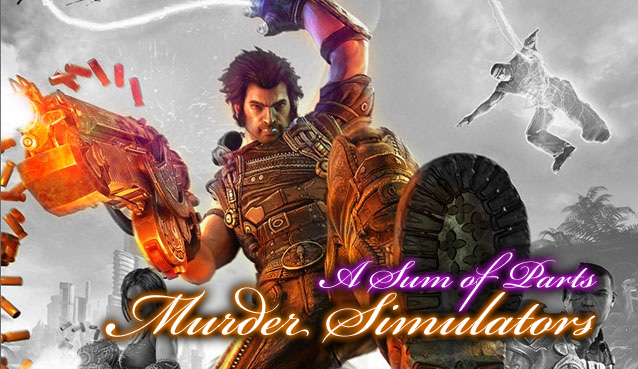
“There are flight simulators, that teach you how to fly. And there are murder simulators, whose only redeeming social value is that they teach you how to commit the act of murder” – Lt. Col. David Grossman.
“It’s a murder party, starring me!” - Grayson Hunt, Bulletstorm.
The term murder simulator has been around for well over a decade now. Used by anti-violent-videogame activists such as David Grossman and Jack Thompson to decry violent content in videogames and its (supposed) effects on children, it is a simple and catchy term that brilliantly captures the imaginations of parents not quite attuned to the nuances of gameplay.
But, more recently, I’ve seen the term arise afresh among videogame players and journalists. Centring on this year’s E3 expo, there’s been a sense of late that the over-the-top, uncritical violence in videogames might actually be going too far. With the number of slow-motion neckstabs on display at this E3 up in the double-digits, even those of us that love videogames are starting to wonder if some of them are, in fact, no more than glorified murder simulators.
This month I will be looking at a game that is proudly and without a doubt is a glorified (and glorious) murder simulator. Epic and People Can Fly’s Bulletstorm revels in the worst excesses of juvenile videogame violence. Much like last month’s Driver: San Francisco, Bulletstorm was a game I initially avoided. Over-the-top violence; crass, sexist, racist characters; extrinsic points instead of any kind of intrinsic emotional reward; and a stupid storyline—it looked like someone took everything that is wrong with generic, AAA shooter design and put it in a pressure cooker.
The thing is, that is exactly what Bulletstorm is. What’s disturbing is that it is all the more brilliant because of it.Bulletstorm takes the worst, most conventional elements of shooters and intentionally combines them in a game that is, simply, a rollicking good time. Whereas a game like Spec Ops: The Line may try (and I would say largely succeeds) to critique shooter games by making the generic shooter feel less enjoyable, Bulletstorm takes the opposite approach: making it as fun as it possible could be. There is nothing in the game itself that tells you that you should feel bad about the ultraviolence you are splashing around everywhere, but just by playing it and by realising you are enjoying it, you can’t help but feel a little… wrong.
This month I’ll be looking at some of the ways Bulletstorm plays up and knowingly accentuates videogame violence along with some other tropes to create a surprisingly sharp critique of the contemporary shooter specifically and videogame violence more broadly. To start with, I’ll look deeper at how Bulletstorm tries (and succeeds) at being a murder simulator.
There are countless games where you kill people in one form or another. Usually it is in self-defence—if you don’t kill them they will kill you. Labelling all such games as murder simulators is great if you simply want to make all violent videogames look bad, but few games ask the player to really revel in that moment of fatally causing violence to someone else’s body. Few, too, are the games that give you a variety of creative ways to commit your killing. And, fewer still, are the games the combine the two: game that ask you to kill creatively and to revel in it.
Bulletstorm does combine both. It is, as the playable character Grayson Hunt says at one point, “killing as an art form”. You are not just killing in self-defence, you are revelling in the act of murder. Simply shooting an enemy dead is perhaps the most disappointing thing you can do in Bulletstorm. The game insists that you use your environment, your boot, and your lasso-like leash in unique combinations to not just kill your opponents, but to murder them in a bizarre, ultraviolent, performance.
As you kick or lasso an opponent, they enter a kind of time-suspension bubble, slowing down just as their body is perfect mutilating distance from your television screen. The world doesn’t slow down, just your target, suspending them in mid-air while you take your time deciding just how you are going to kill them. Maybe chop them in half with a point-blank shotgun shell. Maybe kick them into some razor sharp girders jutting out of the carapace of a wrecked building. Maybe leash then into the path of one of their comrade’s fire.
The game encourages this kind of murder-performance-play not just with the slow motion bodies, but with the game’s point system. Different murders give different amount of points and come with their own punning, crass names. You will sit there, thinking “what if I kill them like this?” and, chances are, the game will reward you with a murder type that you have never performed before, as to pat you on your back for your sadistic creativity.
The point system, rewarding you for killing in creative ways, comes with its own in-world explanation. Apparently, an elite Echo Squad were sent to the planet of Stygia years earlier to clean up the bandits and monsters as some kind of training exercise. Their leashes were used to record how well they performed, handing out points to the more efficient soldiers. These points, in turn, could be used to replenish weapons and ammunition at dropkits scattered across the planet. Those that performed badly, would run out of ammo and die.
The Echo Squad sent to Stygia were in an actual, literal murder simulator. And, following in their footsteps, so is the player as Grayson Hunt. You are doing exactly what the old Echo squad was doing: the points you receive from your creative murders are used to buy ammo, weapons, and new abilities at the long-forgotten dropkits. If you just shoot everyone to death, you will be running out of ammo very regularly. Bulletstorm is a murder simulator about a murder simulator.
It doesn’t just let you kill creatively, it demands that you kill creatively. Just shoot an enemy dead without so much as a headshot and you will get a measly ten points—not even enough to buy the ammo you waste on him—and not even a special title to crown your achievement. It’s the “Good try” award of videogames. A reward that, really, is trying to tell you that you failed.
It’s hard not to be lured by the flashy lights and the upwards numbers of the creative kills. It’s like an audiovisual drug. The other day I used the thumper ability in a room full of enemies. The thumber sends a shockwave through your leash into the ground, throwing enemies and object high into the air where they momentarily hang in suspension. Three enemies splatted into a low ceiling, exploding in blood and limbs. The word FLYSWATTER X3 appears three times in that corner of the screen, flickering a neon, visual applause. Another two bandits are still suspended up in the sky beside an explosive barrel that also went up with the thumb. I shoot the barrel, and the shockwave tears them to shreds. FERTILISER X2 appears over the gore that rains back down next to the word NEW, acknowledging that I have murdered creatively in a new way.
It’s all good fun. It’s all satisfying and violent and everything you want from a shooter. But then my partner walks into the room while I am playing and sees what I am doing. Or I write it out in an essay like I just did, and it feels kind of… wrong. Whereas most shooters attempt to justify the endless violence with some kind of framing narrative or an unredeemably evil enemy, Bulletstorm is more honest. It is a murder simulator, and it doesn’t try to be abything else. It is asking me to kill and it is forcing me to realise just how much I enjoy that simple, singular act of killing in these games. A body is flying past me in slow-motion and I am methodically debating shooting his head off or kicking him into a cactus. Sure, I can say I’m just doing it for the points that I need to progress, but just as Grayson Hunt was clearly a psychopath before crashl-anding on this planet, I clearly enjoyed virtual acts of murder before I played Bulletstorm.
Bulletstorm is a videogame about videogames, a murder simulator about murder simulators. Bulletstorm doesn’t tell me that I should feel bad for what I do in violent videogames. On the contrary, it tells me without a flicker of irony or doubt that this is and should be enjoyable. Actually, that isn’t quite accurate. Bulletstorm doesn’t tell me anything; it forces me to admit that I enjoy this. It’s a strange, non-judging passive-aggression. Oh, you like murdering people in gory ways just for more meaningless points? That’s nice. Here is a guy you could decapitate for twenty-five points. You don’t have to, but I think we both know you want to.

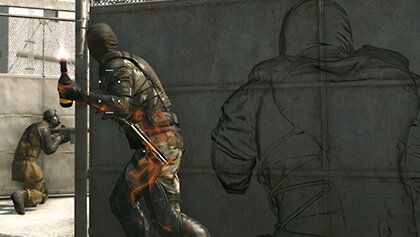
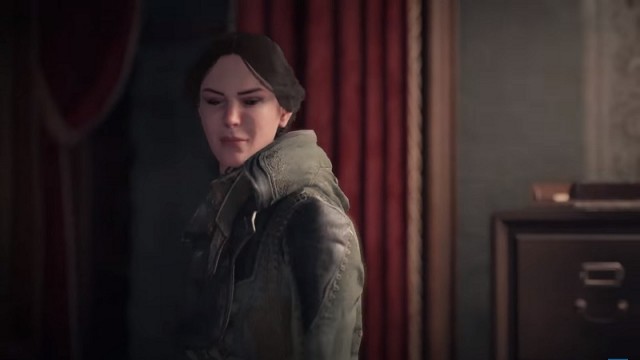
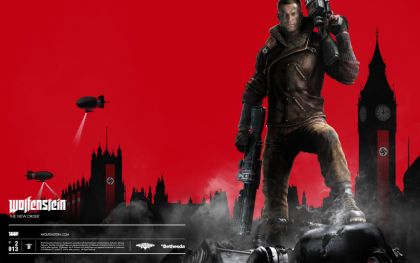
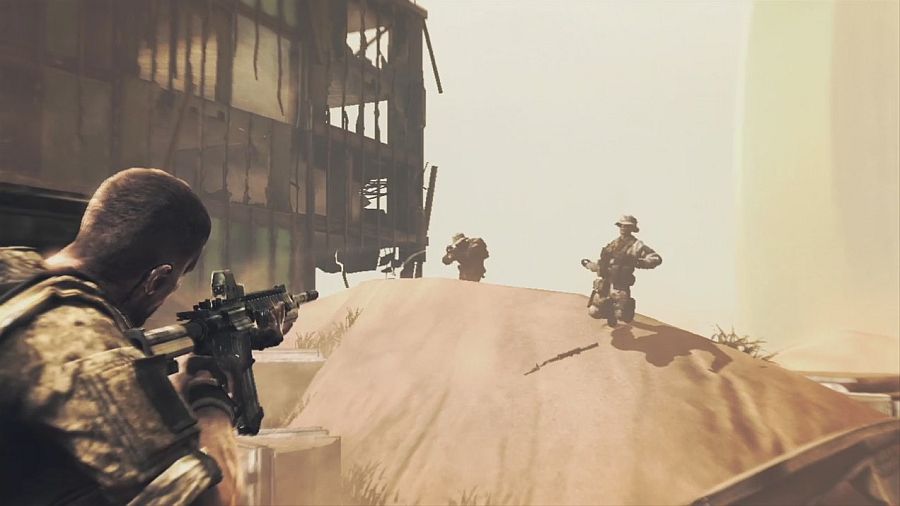 Spec Ops: The Line Tips & Tricks
Spec Ops: The Line Tips & Tricks Neverwinter Interview With Systems Designer Lindsay Haven
Neverwinter Interview With Systems Designer Lindsay Haven How to Get a Free Raffle Ticket Template for Microsoft Word
How to Get a Free Raffle Ticket Template for Microsoft Word Black Ops: First Strike Map Pack Zombie Perk Guide
Black Ops: First Strike Map Pack Zombie Perk Guide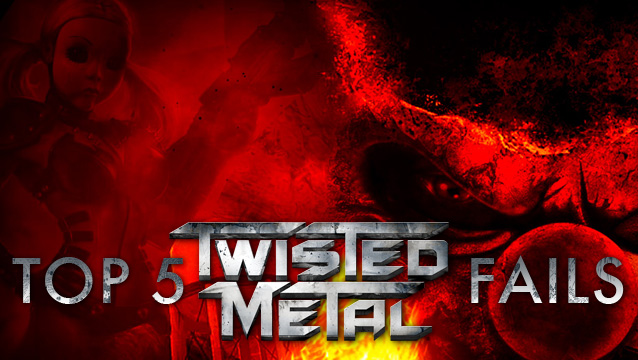 Top 5 Twisted Metal Fails
Top 5 Twisted Metal Fails